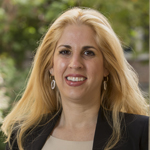Israel’s parliament has passed a law funding long-term savings accounts for all newborns, based on a proposal developed by Michal Grinstein-Weiss, PhD, professor at the Brown School at Washington University in St. Louis and associate director of the Center for Social Development (CSD), and on research efforts led by Michael Sherraden, PhD, the George Warren Brown Distinguished University Professor and director of CSD.

“This is an important policy innovation and a great step toward achieving a better future and reducing income and assets inequalities in the long run,” Grinstein-Weiss said.
The Knesset, the national legislature of Israel, sealed the accounts into law Nov. 18. Grinstein-Weiss had drafted a plan for Child Development Accounts (CDAs) in 2010 with Israel’s then-Minister Social Affairs Isaac Herzog. The nation’s cabinet approved the budget with the accounts Aug. 6.
Under the new law, Israel’s child accounts, known as CDAs in the United States, would be established for all newborns in Israel. The law allows recipients to access funds at age 18 for education, small business enterprise, marriage or homeownership. At age 21, the funds will be accessible with no restrictions, Grinstein-Weiss said.
About a third of Israeli children live below the poverty line. The new accounts will build on Israel’s existing child allowance. Each child will receive 50 shekels each month, equivalent to $13.20, for long-term savings. The money will be in addition to the amount received for his or her regular child allowance and go to the child’s mother starting January 1, 2017.
The debate over and subsequent approval of the measure rapidly raised awareness in Israel of Child Development Accounts, said Grinstein-Weiss, a native of Israel. Now, “in general there is a lot of enthusiasm for the idea across all income and religious groups,” she said.
CSD has a long history in Israel’s discussion of accounts for children. In 2004, Sherraden, working with Jewish and Arab colleagues in Israel, proposed a Middle East Development Account for all Israeli and Palestinian children. As a first step toward the goal, accounts for all impoverished Israelis were then under consideration by national policymakers. In 2008, the Israeli government again announced planning for child accounts.
The center has been instrumental in other CDA policies internationally, including national-level policies in the United Kingdom and South Korea.
“The larger vision is, someday, an account for every child on the planet,” said Sherraden, a leading international scholar on asset building.
“Technology is rapidly making this technically achievable and financially sustainable,” he said. “The hard work ahead is in policy design and political will. On these, we are making steady progress.”
CSD has conducted research on CDAs for years. Its SEED for Oklahoma Kids experiment is a crucial policy test in the United States, offering the first model of universal and progressive Child Development Accounts.
Grinstein-Weiss has served as a consultant to the Israeli government on various projects designed to promote social and economic development.
In September 2014 in New York City, she made a presentation to a delegation of Israeli officials about the importance of asset building as a strategy to address rising levels of income inequality and poverty, emphasizing her proposal for a national CDA program for Israel. Key Israeli officials attended the presentation, among them the director generals of the National Insurance Institute of Israel, Ministry of Social Affairs, the Ministry of Education and the Ministry of Health.